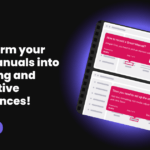
Adaptive learning is a technology that adjusts to the needs and abilities of learners, preparing online learning programs, providing necessary materials and tests on subjects, and creating an individualized learning plan based on the learner’s aptitude and comprehension of new knowledge.
Table of Contents
How Does It Work?
This approach has gained popularity due to the active development of new technologies and collaborations between software developers and educational publishers. These advancements help technologically structure an individualized learning plan based on user needs and capabilities. The primary goal of adaptive learning is to achieve excellent learning outcomes by analyzing knowledge gaps and addressing weaknesses for each learner. By adapting to their pace and learning effectiveness, it accommodates the educational process accordingly.
Adaptive learning platforms can also select the most suitable lessons and modules, classify students’ responses, and provide assessments of their progress. Before a student reaches out to an instructor, the system generates a report on their performance, along with recommendations for modifying the learning approach. This simple example illustrates what adaptive learning is and the objectives its developers strive for.

Most often, adaptive learning platforms operate as web applications. After completing a set of tasks, the system updates the training plan and adds previously challenging topics that the student had difficulty with.
Benefits of Adaptive Learning
- Flexible Learning Pace: Learners have the freedom to choose their own pace and speed of learning, ensuring a personalized and comfortable experience.
- Visible Progress and Motivation: Visible progress throughout the learning process fosters motivation to complete the course, as learners can witness their achievements firsthand.
- Access to Comprehensive Materials: Open access to all learning materials, online support from instructors and the system itself, empower learners with an extensive knowledge base.
- Efficient Knowledge Acquisition: Learners reported being able to absorb more information through adaptive learning, enabling them to gain a deeper understanding of the subject matter.
- Enhanced Self-Confidence: By evaluating learners’ actual knowledge rather than relying solely on completion deadlines, adaptive learning boosts their confidence and sense of accomplishment.
- Cost-Effective Approach: Adaptive learning is a cost-effective method compared to traditional training, as it optimizes resources and provides targeted learning experiences.
Adaptive Learning in the HR Sphere
Adaptive learning proves to be time-saving when it comes to employee training. According to LinkedIn, time constraints for additional employee training have become a top concern in entrepreneurship. Adaptive learning allows teams to study the necessary materials at their own pace, addressing this issue.
A survey revealed that 59% of employees are dissatisfied with the quality of traditional supplementary education, which can be a significant reason for considering a job change. However, employees in companies that implement adaptive learning note that this method makes learning more engaging.
Adaptive learning facilitates better retention of job-related information. A study conducted by Harvard Business Review confirmed that newly learned information is often forgotten within six days. Adaptive learning, on the other hand, maximizes the retention of material, with carefully curated courses and exercises designed for better comprehension.

It is essential to note that adaptive learning analyzes user feedback and corrects mistakes in both the learning approach and content materials. At HintEd, we also employ the Adaptive Learning approach to train employees on corporate programs and software. As not all employees possess the same level of technical knowledge, we provide different materials tailored to their proficiency levels. We also create specific scenarios for different departments to focus their learning efforts on the aspects directly relevant to their work. Curious to see how it works in practice? We will be happy to demonstrate HintEd and guide you on how to best structure your employees’ learning path towards utilizing corporate systems.
Adaptive learning offers numerous advantages in employee training, such as flexible pacing, visible progress, comprehensive materials, enhanced confidence, and cost-effectiveness. It addresses the challenge of time constraints and increases engagement and knowledge retention. By incorporating adaptive learning into HR practices, companies can optimize their training efforts and empower employees with the skills and knowledge necessary for success.



